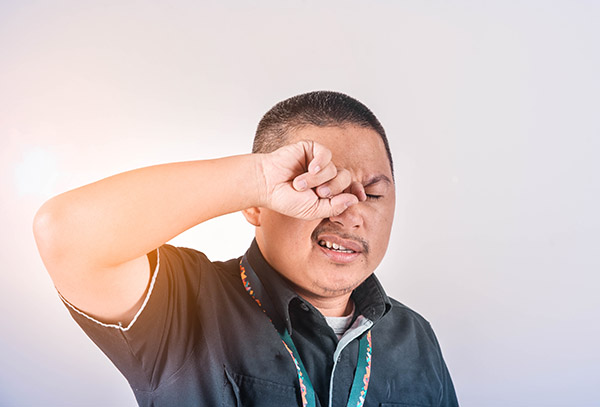Is it COVID-19 or Seasonal Allergies?
By Kristy Warren
With Coronavirus (COVID-19) dominating the news, you may be feeling anxious about every cough, sneeze, or sniffle. As we welcome summer, a common culprit for respiratory symptoms is also making a comeback: seasonal allergies. From flowers and grasses to budding trees, there’s a lot of new allergens to make us sneeze.
It has been estimated that each year, more than 50 million Americans experience some form of allergic rhinitis—an inflammation in the lining of the nose caused by allergies. An allergy is an immune response to something your body shouldn’t “attack.” When you have an allergic reaction, your body attacks a typically harmless substance like ragweed or cat hair as if it was an illness.
Both COVID-19 and allergies affect the respiratory tract—the path air takes through your nose, mouth, throat, and lungs. So, how can we tell the difference between allergies and a respiratory illness like COVID-19?
ALLERGIES VS. COVID-19
While both can make you cough, they present with different key symptoms. COVID-19 most often includes a fever, shortness of breath, diarrhea, and a dry cough, meaning you aren’t bringing up any mucus.
Seasonal allergies do not present with a fever or intestinal issues, and unless they are very severe, do not cause difficulty breathing.
Thebiggest differentiator for allergiesis how quickly they present when you’re exposed to an allergen (no incubation period) and feeling itchy—itchy eyes, throat, mouth, or skin.

Common COVID-19 symptoms:
- Fever
- Shortness of breath (i.e., difficulty breathing and inability to catch your breath)
- Dry cough
- Diarrhea
- Body aches and chills
- Fatigue
Common allergy symptoms:
- Itchy or watery eyes
- Sneezing
- Runny or stuffy nose
- Clogged ears
- Scratchy, itchy throat
- Hives, redness, or skin welts

Another way to determine if seasonal allergies are to blame is to look at the onset of your symptoms. Ask yourself if your symptoms are persistent all day long or change based on where you are and what you’re doing: do your symptoms begin when you step outside or are exposed to a specific thing (e.g., a dog or cat, blooming trees, your backyard)? Do your symptoms resolve after taking an antihistamine or steroid nasal spray?
If you start sneezing around the first week of May every year, chances are you are allergic to a plant that is blossoming during that time. If your eyes always get itchy after petting your neighbor’s cat, you are likely allergic to the cat’s dander.
WHY DO ALLERGIES MAKE ME SO MISERABLE?
Many people find themselves—and their sinuses—suffering through the seasons. When an allergen enters your nose, skin, or mouth, it triggers a defensive response from your immune system. For example, when a person with a ragweed allergy inhales ragweed particles, their immune system’s antibodies are waiting in the cells of their eyes, nose, and lungs to fight it. As the antibodies work to capture and neutralize the ragweed, they release chemicals like histamine, which results in common allergy symptoms like sneezing, runny nose, and itchy eyes.
FINDING THE RIGHT TREATMENT
If you or a loved one are experiencing the COVID-19 symptoms listed above or are concerned about a potential exposure, you should call your family doctor right away. Even if your case is mild and able to be safely managed at home, it is important to get the right diagnosis in order to plan your treatment, determine your risk for developing complications, and protect others in your household and community by isolating to avoid spreading the virus.
Laurel Health is available 24/7 to answer your health questions, review symptoms, and schedule both in-person and telemedicine appointments.
Mild to moderate seasonal allergies can often be well-managed with over-the-counter antihistamines and decongestants, but each person responds to allergy medications differently. Finding the right medication for your sinuses may take some trial and error or an expert opinion. Whether you’re concerned about COVID-19 or battling seasonal allergies, the Laurel Health Centers are here to help.
All Laurel Health locations offer in-person and flexible telemedicine visits via phone and video chat to meet your health needs safely. If you are struggling with allergies, make an appointment to discuss your options. Call 1-833-LAURELHC (1-833-528-7354), visit our provider page or click here to visit our contact page.
